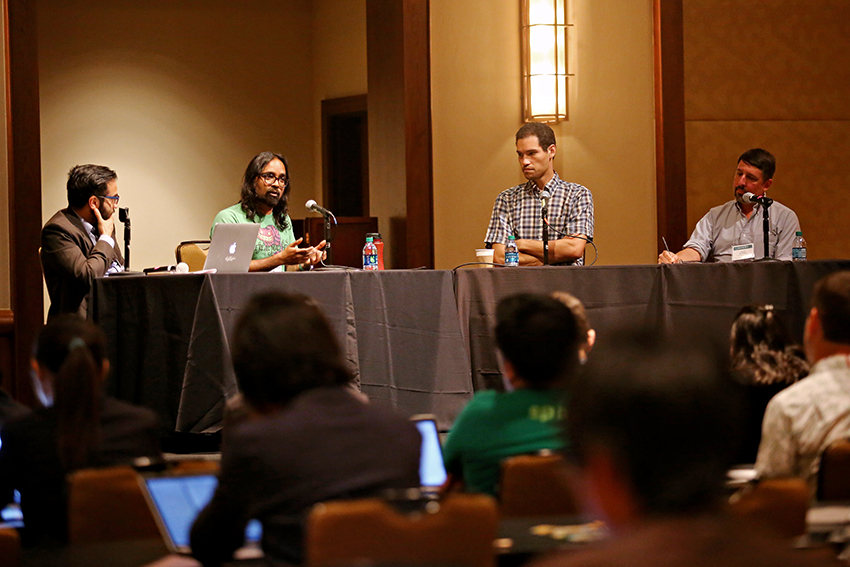On Monday, a panel of artificial intelligence experts met to discuss questions on one theme: How will jobs change as artificial intelligence becomes more and more capable?
This specific industry panel discussed the role of artificial intelligence in crowdsourcing platforms, or organizations that use large amounts of people to accomplish things. The panel was part of the fourth Association of Advancement of Artificial Intelligence conference on Human Computation and Crowdsourcing held at the AT&T Conference Center Oct. 30-Nov. 3.
The panel included Praveen Paritosh, Google senior research scientist, Joe Deshotel, director of community at Ride Austin, and Matt Manning, founder of Information Evolution, an information services consulting company.
Moderator Anand Kulkarni, co-founder and chief scientist at LeadGenius, began the conversation by discussing the factors needed for society to transition to automated industry.
Deshotel said customers’ confidence in the company will play a crucial role in Ride Austin’s application of automated vehicles.
“You’re talking about directly interfacing with customers in the way that they need to have the confidence,” Deshotel said. “If your work gets done [by automation], that’s fine, but if your work is carrying me someplace, then there’s going to be a different level of confidence you need to have.”
Even the concept of automation in general — think voice recognition or smart fridges — is subjective and nuanced, according to Paritosh, who emphasized the importance of expanding the complexity of automation.
“It’ll probably take us a year to automate what we [as humans] can do in a second,” Paritosh said. “But humans do things that take more than a second. We can automate things that are simple, but humans are capable of more complex things, so for example, automating this panel would take a lot of time.”
As crowdsourcing platforms, such as RideAustin or Uber, begin to use artificial intelligence, Manning said companies ought to acknowledge the effect this technological transition has on the workforce.
“Outsourcing business can be kind of cruel, especially for small businesses,” Manning said.
However, Deshotel said the advancement of the artificial intelligence industry will not necessarily cut jobs, but instead could increase work opportunities involving artificial intelligence.
“It’s about saying to workers, ‘Okay, employees, here’s what the future lies in,’ and not creating this adversarial relationship but rather a partnership and understanding of where the market is going,” Deshotel said. “If we can work smarter, then that actually has a greater benefit for our workforce than us manually slogging to get the payments in on time.”
According to Paritosh, businesses have no legal responsibility to find jobs for the workforce. Instead, the onus that lies on industries and scientists is to keep raising the bar on what is considered “smart.” As the technological standard increases, more and more jobs will be available, Paritosh said.
A question from the audience discussed the potentially intimidating speed at which technology is adapting today.
According to Manning, technology has always changed lives and artificial intelligence is not a radically new development.
With the seeming inevitability of automation and artificial intelligence, the panelists agreed that working with governmental regulations and focusing on educational platforms to inform crowds is crucial.
“You have to work well with government and focus on high schools … ultimately it filters down to education,” Deshotel said. “It’s about work shifting, not work disappearing.”
The idea of artificial intelligence must continually develop, including “human” concepts such as common sense, sarcasm and humor, Paritosh said.
“My biggest fear is that we define intelligence so low that we call it done,” Paritosh said. “What we call automation may be much more than we thought.”















